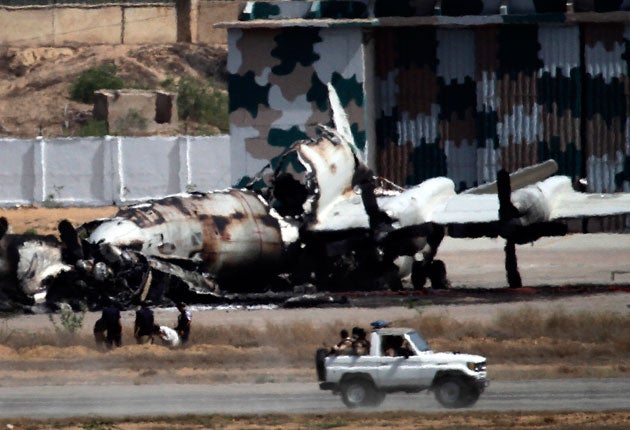Pakistan humiliated by Bin Laden revenge attack

Your support helps us to tell the story
From reproductive rights to climate change to Big Tech, The Independent is on the ground when the story is developing. Whether it's investigating the financials of Elon Musk's pro-Trump PAC or producing our latest documentary, 'The A Word', which shines a light on the American women fighting for reproductive rights, we know how important it is to parse out the facts from the messaging.
At such a critical moment in US history, we need reporters on the ground. Your donation allows us to keep sending journalists to speak to both sides of the story.
The Independent is trusted by Americans across the entire political spectrum. And unlike many other quality news outlets, we choose not to lock Americans out of our reporting and analysis with paywalls. We believe quality journalism should be available to everyone, paid for by those who can afford it.
Your support makes all the difference.Pakistan was last night conducting a major manhunt for the two terrorists who managed to escape after mounting the one of the most brazen attacks yet on the country's powerful military.
President Asif Ali Zardari has ordered an inquiry into how six attackers besieged the Mehran naval base in Karachi on Sunday, a raid that lasted for 17 hours. The six managed to slip into the base unnoticed, damage two military aircraft, kill 10 security personnel and wound 15 others before commandos were able to overpower them.
"It was the revenge of martyrdom of Osama bin Laden," Ehsanullah Ehsan, a spokesman for the Pakistani Taliban, said. "It was the proof that we are still united and powerful." Since the 2 May US raid that eliminated Bin Laden, Pakistan has been reeling from a series of deadly and high-profile attacks.
Interior minister Rehman Malik said al-Qa'ida and the Pakistani Taliban had convened somewhere in Waziristan to plot a series of revenge attacks in the days after Bin Laden's death. "They decided to attack the army, security installations and some VIPs," Mr Malik told reporters in Karachi yesterday.
For the military, the naval-base siege comes as a fresh embarrassment. The Bin Laden operation exposed leading officials to rare criticism, with many asking why they had first failed to locate the leader of al-Qa'ida and then failed to notice the American helicopters arriving.
Now the military leadership is confronted by fresh accusations of a glaring intelligence failure. Mr Malik said Mr Zardari had ordered an inquiry into how the attackers were able to penetrate the sensitive security installation.
As in the case of Bin Laden, who is suspected of having spent as long as five years at his Abbottabad compound, many in Pakistan wonder whether the siege could have been mounted without at least some involvement from inside the country.
"These people who attacked knew what time would be the most appropriate, they knew from where to enter and how to go about it," retired Air Marshal Riazuddin Shaikh said. "It seems they had a lot of information, the question is whether it was provided to them. It is my feeling that it was provided to them."
Mr Malik said that the attackers had used ladders to breach a vulnerable wall at the back of the facility. The six men were dressed in black Western-type clothing, he said. They used cutters, which were later retrieved to sever the curled barbed wire that crowned the wall.
Once inside, the men moved in a manner that allowed them to exploit blind spots between the security cameras. The attackers went immediately to a hangar where two Lockheed P-3C Orion aircraft were housed, firing on them with rocket-propelled grenades.
The attackers' principal aim was to destroy the aircraft and they were prepared to die in the process. It was a highly co-ordinated "fidayeen" attack similar to the September 2009 siege of the army's headquarters in Rawalpindi. "They do not want to come out alive, they have gone there to embrace martyrdom," Mr Ehsan told AP during the siege.
None of the attackers was taken alive, Mr Malik said. Initially, it was believed that up to 15 had been involved. It later emerged that there were only six. One killed himself by exploding a suicide vest. Three others were killed and two managed to escape.
As far back as 2006, the Pakistani military has had to deal with extremist sympathisers in its ranks, with a leaked US State Department cable revealing monthly reports of "acts of petty sabotage" to Pakistan's fleet of F-16s in an attempt to keep them from being deployed in support of operations in Pakistan's tribal area in the north-west of the country.
Bin Laden's compound was found just a few kilometres away from a major military academy.
Join our commenting forum
Join thought-provoking conversations, follow other Independent readers and see their replies
Comments